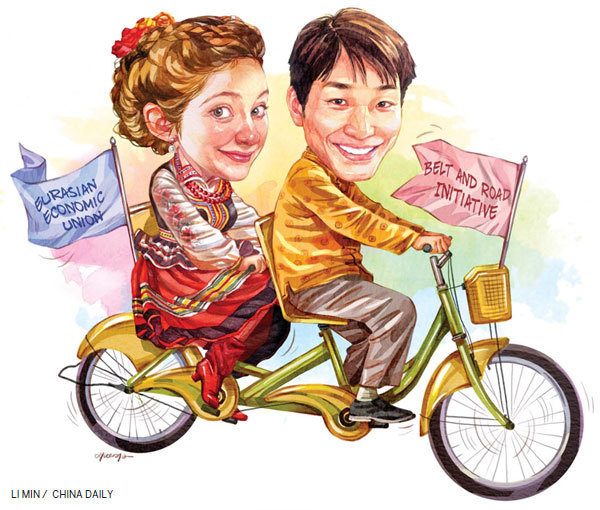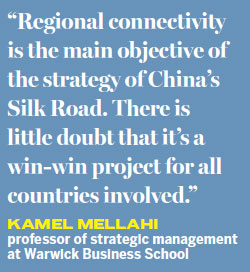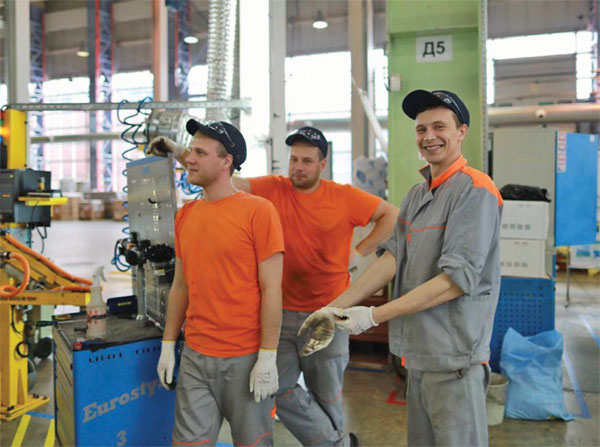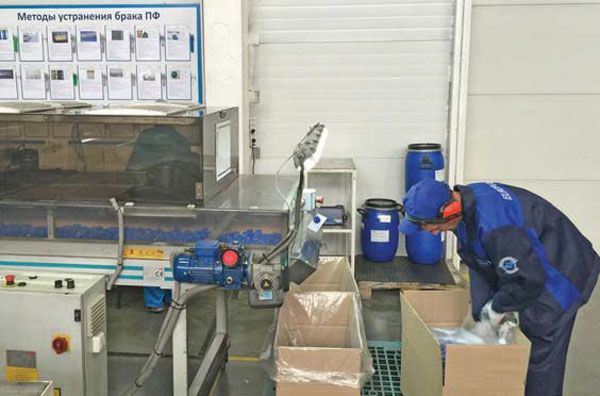Perfect partners
Updated: 2016-09-23 07:58
By Ren Qi in Vladivostok, Russia and Chen Yingqun in Beijing(China Daily Europe)
|
|||||||||
China and Russia eye the benefits of pan-Eurasian cooperation
Russian workers operate Italian plastic bottle cap manufacturing machines in a factory named Euro Plastic. In the room are piled sacks of plastic raw materials from China.
Located in Vladivostok, the largest city in Russia's far east, the modern factory seems to reflect the current international business mood of the country.

On one hand, the name Euro Plastic shows the ambition of Russian enterprises to gear up to the European market.
But the factory has almost no connection with Europe, as trade between Russia and EU has plummeted since the latter applied stern sanctions in the wake of the Ukraine crisis.
On the other hand, the light industry of Russia, even as something as small as plastic bottle cap manufacturing, has a strong need for China's raw materials.
China is looking for more economic cooperation with the largest country in the world.
It received encouragement when its Belt and Road Initiative was given a positive response by the Russian leader in June after being first proposed in late 2013.
Chinese President Xi Jinping and his Russian counterpart Vladimir Putin signed a joint declaration on cooperation in coordinating development of the Eurasian Economic Union and Silk Road Economic Belt in May last year.
Further, Putin stated in an interview with Chinese media during the St. Petersburg International Economic Forum in June that Xi's Belt and Road Initiative was an interesting one with good timing, and the countries of the union all agreed to start cooperation under the framework of the Silk Road Economic Belt.
The statement from Russia that the two projects appear to have such a bright future surprised experts from both countries, as years ago the two proposals were seen as competitors in the region.
Alexander Gabuev is a senior associate of the Russian Moscow Center think tank, and he says China's economic and political clout in resource-rich Central Asia is growing, "sometimes at Russia's expense".

Gabuev says it is an undeniable fact that the Belt and Road used to be a major concern for Russia before 2015, and the initiative was seldom responded to by Russian officials. However, in the past two years, the international situation has changed tremendously. Russia's economy fell so fast that the former superpower realized the importance of enhancing cooperation with the giant initiative.
Fifty-seven countries signed on as founding members of the China-initiated Asian Infrastructure Investment Bank last year. Moreover, as well as pledging $100 billion for the bank's coffers, China also established the $40 billion Silk Road Fund.
Kerry Brown, from the China Studies Center at Sydney University, says China would like to provide countries along the road with low-interest, long-term loans - similar to those given in Africa for big infrastructure projects.
"Regional connectivity is the main objective of the strategy of China's Silk Road," says Kamel Mellahi, a professor of strategic management at Warwick Business School. "There is little doubt that it's a win-win project for all countries involved."
Russia agrees. Now more Russians, both government officials and entrepreneurs, want to participate in the Belt and Road Initiative.
Eugene Belokurov, general manager of Euro Plastic Vladivostok, says the raw materials in the factory are 100 percent from China. However, he is more interested in attracting China's cooperation in the fields of technology and investment.
At present there are seven Euro Plastic factories in Russia, and more than 50 billion plastic products are produced by the company every year. The business is still in the investment payoff period and has not yet made a profit, after investment in the factories reached 250 million roubles ($3.8 million; 3.5 million euros; 3 million). Yet Belokurov sees much potential for the company. He says that if it can receive technological support and financial investment from Chinese enterprises or factories, Euro Plastic may open more factories.
Belokurov's expectation reflects those of Russian companies that start branches in the relatively less-developed far east, and exploring cooperation with China has also become one of the main tasks for government sectors of Russia.
The Ministry for Development of the Russian Far East is responsible for the economic and social development in the region. Alexander Galushka, minister of the federal ministry, says Russia, especially the far east, will play an important role in coordinating the development of the EEU and the Belt and Road Initiative.
The far east region has so far attracted investment over of $16.9 billion, 14.7 percent of which - including cement plants, road construction projects, and investment in economic zones - comes from China.
On June 30, the Russian government approved the establishment of the 13th Advanced Development Territory in Khabarovsk state, and there will be $1.2 million of Chinese investment in the rivet manufacturing industry.
In March, Russian media reported that Chinese investors had injected more than $1.9 billion into Russian far east development projects, including an oil refinery and a logistical center, as well as a cement factory and a plant for reworking ferrous scrap metals.
Galushka says Russia always welcomes China's participation in the development of the far east. "We are planning to build more different types of economic zones in the future, and we are expecting more Chinese investors to join."
Considering the ongoing EU sanctions, closer ties between the bloc and the China - Russia project seem threatened. On one hand, those nations want to share the benefits from the up-coming cooperation of the EEU and Belt and Road, but on the other hand, they just can't, he says.
Joerg Wuttke, president of the European Union Chamber of Commerce in China, says if Russia makes progress, that does not necessary hurt Europe, infrastructure will be improved along the Eurasian corridor and that helps Europe a great deal.
"However," he says, "the EU's relationship with Russia will not change. I think the members of the EU have made it very clear that sanctions will remain. It is very sad as this is a natural fit between Europe and Russia.
"For example, Europe has huge overcapacity in milk, and Russia has huge shortage of milk, but we cannot trade."
Wu Fei, a researcher at the Center for China and Globalization, says the European economy may face issues after Brexit, but the EU still maintains a strong role in the cooperation of EEU and Belt and Road.
Wu says the two initiatives are very complementary: the biggest issue of Belt and Road is that there are not so many investment projects along the Silk Road Economic Belt, as well as not many projects with quick payoffs. But there are plenty of such projects in EEU, such as those in the Far East, the Ural mountain area, investment in Yekaterinburg, and development of the Arctic Ocean channel.
Meanwhile, Russia is hoping for more. In President Putin's plan, the cooperation of EEU and Belt and Road will also attract Europe to establish a Pan-Eurasian partner relation.
Chris Cheung, director of the EU SME Center, points out that in order to realize such a relationship, China would be the key element between the EU and Russia, and the EU should not lose faith in China's economy despite its slowdown.
But at least now, the interest of the EU in the Chinese market is still growing, Cheung says. China's policy of moving toward consumption as a greater driver of growth means that there is greater demand for EU products.
He notes China's industry supply chain is in the process of transforming: new technologies will be required to support China's advancing industrial processes, whether it is machines, software or internet-based technologies, and innovative businesses from Europe are eager to take part.
Wu agrees, and he cites the Yekaterinburg investment projects as an example. The projects are attracting Chinese and German capital at the same time.
"If the EEU and Belt and Road can establish some dialogue mechanisms, and combine the manufacturing and consumption of different countries into a integrated strategic alliance - in which China, Russia and European countries are all involved - a real pan-Eurasian partnership is coming," Wu says.
Contact the writers atrenqi@chinadaily.com.cn
|
Some of the Workers at the only car manufacturing factory in Vladivostok, the largest city in Russia's far east. The city government says it hopes to cooperate with Chinese car companies. Photos by Ren Qi / China Daily |
|
The light industry of Russia, even as something as small as plastic bottle cap manufacturing Euro Plastic, has a strong need for China's raw materials. |
(China Daily European Weekly 09/23/2016 page1)
Today's Top News
BBC report on Terracotta Warriors refuted
Iraqi forces recapture more villages around Mosul
Greeks rally against labor reforms
Iraqi forces fighting all out to free Mosul from IS
Chinese pupils flock to UK independent schools
Britain's May, faced with turmoil, agrees to a debate
'Zero Hunger Run' held in Rome
Xi: China considers Bangladesh important partner
Hot Topics
Lunar probe , China growth forecasts, Emission rules get tougher, China seen through 'colored lens', International board,
Editor's Picks

|

|

|

|

|

|









